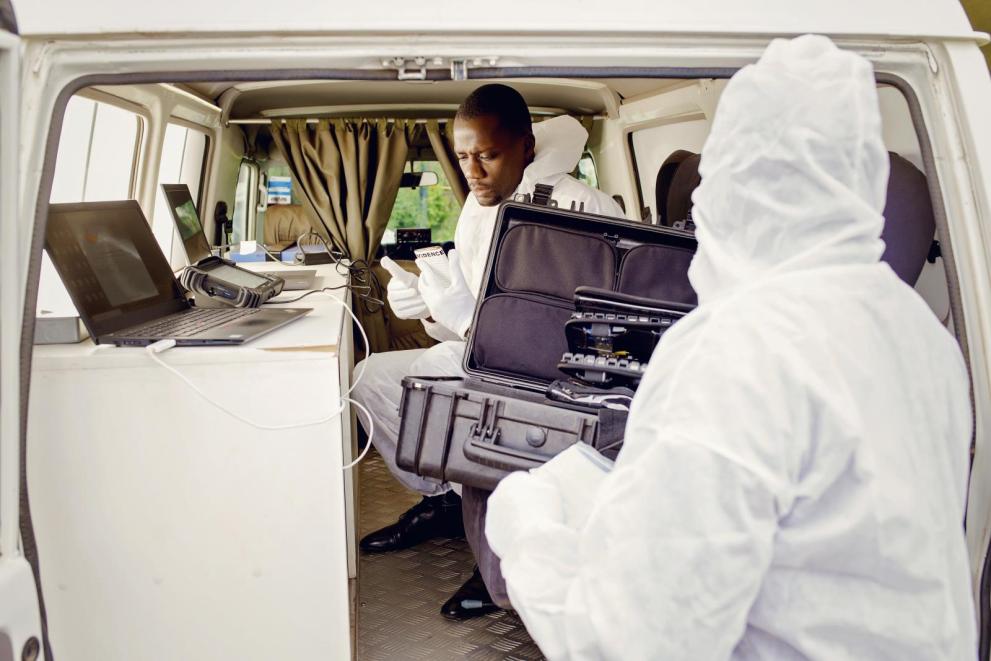
In Kenya, the national Anti-Human Trafficking and Child Protection Unit (AHTCPU) rescues approximately 300 children every year from the clutches of human trafficking. These are the fortunate ones; many other children are lured into the country from neighbouring South Sudan, Somalia, Ethiopia, Uganda, Tanzania, Rwanda and Burundi by the promise of a better life.
In their attempt to escape the difficult environment in their home country where they may be exposed to armed conflict, extreme poverty, harmful cultural practices, including female genital cutting and early marriages, and/or other forms of abuse, most of these children end up alone in big foreign cities, such as Nairobi and Mombasa. Many of them find themselves forced into domestic servitude or even subjected to sexual exploitation, while others are radicalised and recruited into terrorist groups, with no hope of returning home.
Increased capacity to tackle offline and online cases
AHTCPU was established in 2016 as a sub-section of the Directorate of Criminal Investigations of the National Police service, the first unit of its kind in the East African region. Since 2018, it has been supported by the Better Migration Management (BMM) programme, which is funded by the European Union and Germany.
AHTCPU received training and mentorship as well as equipment, including vehicles, to develop and expand its capacity for its 40 officers based in Nairobi and Monbasa. ‘We investigate serious crimes affecting children, working closely with the Director of Public Prosecutions and liaising with the Department of Children’s Services to ensure that children are protected,’ says Ms Mueni Mutisya, Head of AHTCPU.
Furthermore, the unit’s cyber division was launched in April 2019 to tackle cases of online child sexual exploitation and abuse. The unit is equipped with a forensic lab which focuses solely on the triage of seized devices to quickly identify victims and evidence. Additionally, the unit is connected to the Interpol International Child Sexual Exploitation (ICSE) database – the first in Africa.
Identify, locate, rescue and prosecute
AHTCPU works on the basis of information from the general public, the police and other hotline numbers, including cybertips from the US-based National Center for Missing and Exploited Children (NCMEC, non-profit organisation), which provides approximately 600 reports a month.
On this basis, the AHTCPU is identifying and locating children to rescue them, liaising with nearby civil society organisations, in order to provide accommodation for them and psychosocial support.
They also make arrests and interview suspects before preparing evidence to support prosecution. ‘We ensure coordination between different actors when cases go to court,’ explains Ms Mutisya. ‘We work closely with the Kenyan Counter-Trafficking in Persons Secretariat and the Office of the Director of Public Prosecutions.’ AHTCPU is now able to prosecute tens of cases in Kenya annually.
Background
The Better Migration Management (BMM) programme – phase 2, improves the quality of investigations and prosecutions according to international standards. In the framework of this regional programme, GIZ, together with the United Nations Office on Drugs and Crime (UNODC), CIVIPOL and other partners, have been providing mentorship, training and equipment, including vehicles, to improve AHTCPU’s capacity. Training and technical support have focused on identifying and assisting trafficking victims, investigating and prosecuting trafficking cases, handling criminal evidence for investigations, improving understanding of the anti-trafficking law’s legal framework, operationalising the national referral mechanism and detecting fraudulent documents.
BMM supports the management of safe, orderly and regular migration in the region while addressing the smuggling of migrants and the trafficking in human beings within and from the Horn of Africa. Its second phase has a total budget of EUR 35 million (of which EUR 30 million from the EU Emergency Trust Fund for Africa and EUR 5 million from Germany) for the 2019-2022 period.
Details
- Publication date
- 20 September 2022
- Region and Country
- Horn of Africa
- Kenya
- Thematic
- Improved migration management
- Partner
- GIZ

